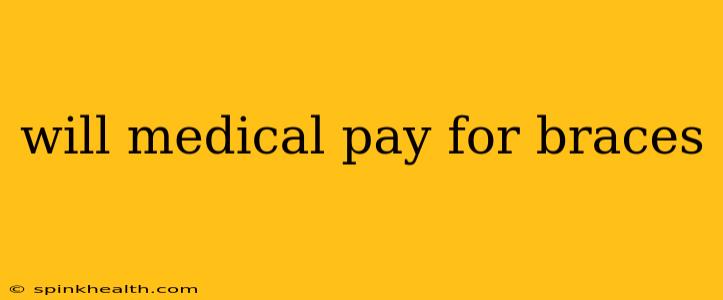Will Medical Insurance Pay for Braces? A Look Inside the World of Orthodontic Coverage
The question of whether medical insurance will pay for braces is a common one, often filled with confusion and frustration. It's a journey many families undertake, fraught with paperwork, phone calls, and the hope of financial relief. Let's unravel this intricate process, shedding light on the factors that determine coverage and offering guidance for navigating the system.
My journey started, like many others, with a simple question: "Will my insurance cover my child's braces?" The answer, I quickly learned, wasn't a simple yes or no. It depended on a complex interplay of factors, primarily revolving around whether the need for orthodontic treatment is deemed medically necessary, rather than purely cosmetic.
What Does "Medically Necessary" Mean in the Context of Braces?
This is the heart of the matter. Insurance companies generally only cover orthodontic treatment when it addresses a medically necessary condition, not simply for aesthetic improvement. So, what constitutes a medically necessary condition?
This often includes situations where misaligned teeth or jaws impact a person's overall health. Examples might include:
- Severe malocclusion: This is a significant misalignment of the teeth that can lead to difficulty chewing, speaking, or even breathing. Imagine trying to bite into an apple with teeth that don't align properly – the pain and difficulty are substantial. This is where medical necessity often comes into play.
- Temporomandibular joint (TMJ) disorders: Problems with the jaw joint, often related to bite issues, can cause chronic pain and dysfunction. Orthodontic treatment can sometimes alleviate these issues.
- Sleep apnea: In some cases, severe overcrowding or misalignment of the teeth and jaw can contribute to sleep apnea. Correcting these issues through orthodontics may be considered medically necessary to improve breathing and overall health.
How Does My Insurance Company Determine Medical Necessity?
Each insurance company has its own criteria and procedures for determining medical necessity. They usually require documentation from an orthodontist detailing the specific medical reasons for the treatment. This often involves:
- Detailed examination: A thorough assessment of the patient's teeth, jaw, and bite.
- Radiographs (X-rays): These provide a clear picture of the underlying bone structure and the extent of the misalignment.
- Supporting documentation: A comprehensive report outlining the medical reasons for treatment and the expected outcomes.
Often, a pre-authorization is required before the treatment begins. This involves submitting the required documentation to the insurance company for review and approval. Without pre-authorization, you may be responsible for the full cost of the treatment.
What if My Insurance Doesn't Cover Braces?
If your insurance deems the treatment cosmetic rather than medically necessary, you may be responsible for the entire cost of braces. However, many orthodontists offer payment plans to help make treatment more affordable. It's crucial to discuss payment options with your orthodontist upfront.
Does the Type of Insurance Matter?
Yes, the type of insurance coverage you have significantly impacts whether your braces will be covered. Some plans provide better coverage for orthodontic treatment than others. Always review your policy details carefully, or contact your insurance provider directly to inquire about coverage specifics.
What About Medicaid and CHIP?
Medicaid and CHIP (Children's Health Insurance Program) may cover orthodontic treatment in certain situations, often focusing on medically necessary cases. Eligibility varies by state and specific plan. Contact your state's Medicaid or CHIP office for more information.
In conclusion, the answer to "Will medical insurance pay for braces?" isn't a simple yes or no. It depends on a careful evaluation of medical necessity, your specific insurance policy, and the documentation provided by your orthodontist. Open communication with your insurance provider and orthodontist is crucial throughout the process. Remember, proactive engagement can make a significant difference in navigating the complexities of insurance coverage for orthodontic treatment.

